Analyzing the Evolution of Management Practices: A Detailed Report
VerifiedAdded on 2023/06/13
|9
|2699
|297
Essay
AI Summary
This essay provides a comprehensive overview of the evolution of management practices, tracing its development from pre-industrial times through the industrial revolution and into the post-industrial era. It examines how management practices have transformed in response to changing economic, social, and technological landscapes. The essay discusses early management approaches, the impact of scientific management theories, the rise of industrial unions, and the shift towards more human-centric approaches in the neo-classical era. Furthermore, it highlights the influence of key management theories, such as Taylor's scientific management and Fayol's administrative management, on organizational structures and employee motivation. The analysis extends to modern management approaches, including management by objectives (MBO) and contingency approaches, emphasizing the importance of innovation, teamwork, and adaptability in contemporary business environments. The essay concludes by noting the ongoing evolution of management practices in response to factors like globalization, technological advancements, and the changing nature of work.
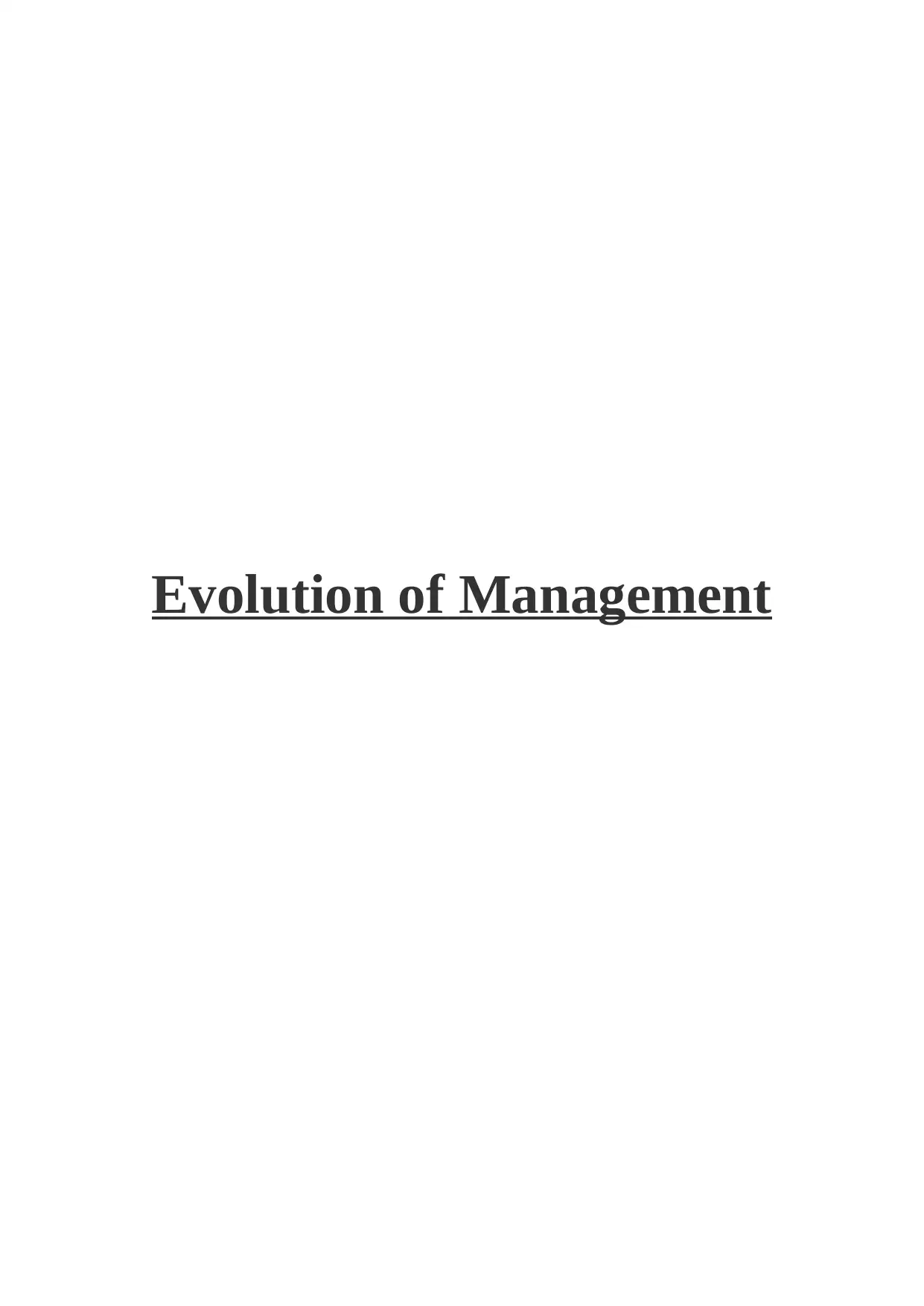
Evolution of Management
Paraphrase This Document
Need a fresh take? Get an instant paraphrase of this document with our AI Paraphraser

CONTENTS
INTRODUCTION .....................................................................................................................................3
MAIN BODY............................................................................................................................................3
CONCLUSION.........................................................................................................................................7
REFERENCES..........................................................................................................................................9
INTRODUCTION .....................................................................................................................................3
MAIN BODY............................................................................................................................................3
CONCLUSION.........................................................................................................................................7
REFERENCES..........................................................................................................................................9
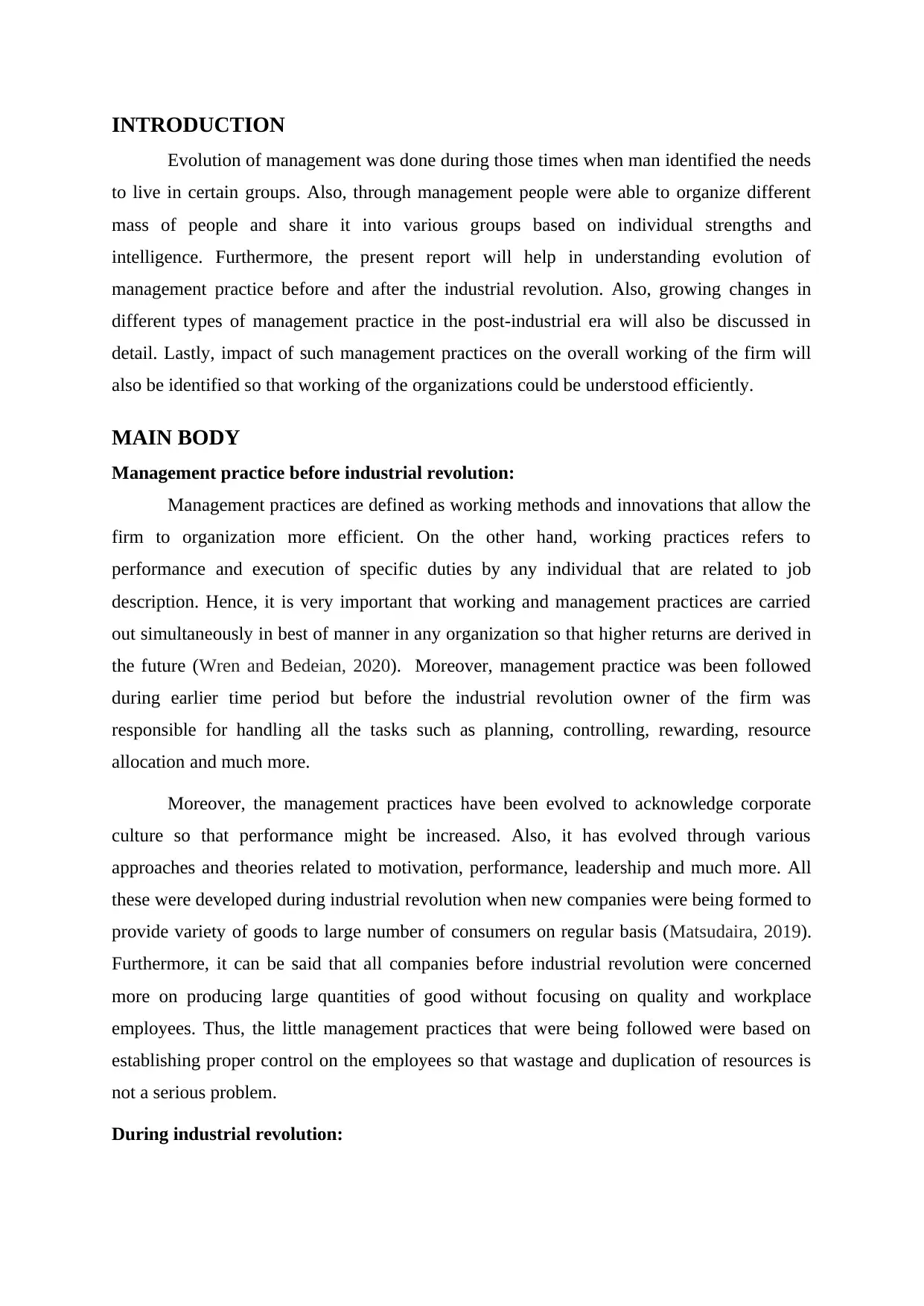
INTRODUCTION
Evolution of management was done during those times when man identified the needs
to live in certain groups. Also, through management people were able to organize different
mass of people and share it into various groups based on individual strengths and
intelligence. Furthermore, the present report will help in understanding evolution of
management practice before and after the industrial revolution. Also, growing changes in
different types of management practice in the post-industrial era will also be discussed in
detail. Lastly, impact of such management practices on the overall working of the firm will
also be identified so that working of the organizations could be understood efficiently.
MAIN BODY
Management practice before industrial revolution:
Management practices are defined as working methods and innovations that allow the
firm to organization more efficient. On the other hand, working practices refers to
performance and execution of specific duties by any individual that are related to job
description. Hence, it is very important that working and management practices are carried
out simultaneously in best of manner in any organization so that higher returns are derived in
the future (Wren and Bedeian, 2020). Moreover, management practice was been followed
during earlier time period but before the industrial revolution owner of the firm was
responsible for handling all the tasks such as planning, controlling, rewarding, resource
allocation and much more.
Moreover, the management practices have been evolved to acknowledge corporate
culture so that performance might be increased. Also, it has evolved through various
approaches and theories related to motivation, performance, leadership and much more. All
these were developed during industrial revolution when new companies were being formed to
provide variety of goods to large number of consumers on regular basis (Matsudaira, 2019).
Furthermore, it can be said that all companies before industrial revolution were concerned
more on producing large quantities of good without focusing on quality and workplace
employees. Thus, the little management practices that were being followed were based on
establishing proper control on the employees so that wastage and duplication of resources is
not a serious problem.
During industrial revolution:
Evolution of management was done during those times when man identified the needs
to live in certain groups. Also, through management people were able to organize different
mass of people and share it into various groups based on individual strengths and
intelligence. Furthermore, the present report will help in understanding evolution of
management practice before and after the industrial revolution. Also, growing changes in
different types of management practice in the post-industrial era will also be discussed in
detail. Lastly, impact of such management practices on the overall working of the firm will
also be identified so that working of the organizations could be understood efficiently.
MAIN BODY
Management practice before industrial revolution:
Management practices are defined as working methods and innovations that allow the
firm to organization more efficient. On the other hand, working practices refers to
performance and execution of specific duties by any individual that are related to job
description. Hence, it is very important that working and management practices are carried
out simultaneously in best of manner in any organization so that higher returns are derived in
the future (Wren and Bedeian, 2020). Moreover, management practice was been followed
during earlier time period but before the industrial revolution owner of the firm was
responsible for handling all the tasks such as planning, controlling, rewarding, resource
allocation and much more.
Moreover, the management practices have been evolved to acknowledge corporate
culture so that performance might be increased. Also, it has evolved through various
approaches and theories related to motivation, performance, leadership and much more. All
these were developed during industrial revolution when new companies were being formed to
provide variety of goods to large number of consumers on regular basis (Matsudaira, 2019).
Furthermore, it can be said that all companies before industrial revolution were concerned
more on producing large quantities of good without focusing on quality and workplace
employees. Thus, the little management practices that were being followed were based on
establishing proper control on the employees so that wastage and duplication of resources is
not a serious problem.
During industrial revolution:
⊘ This is a preview!⊘
Do you want full access?
Subscribe today to unlock all pages.

Trusted by 1+ million students worldwide
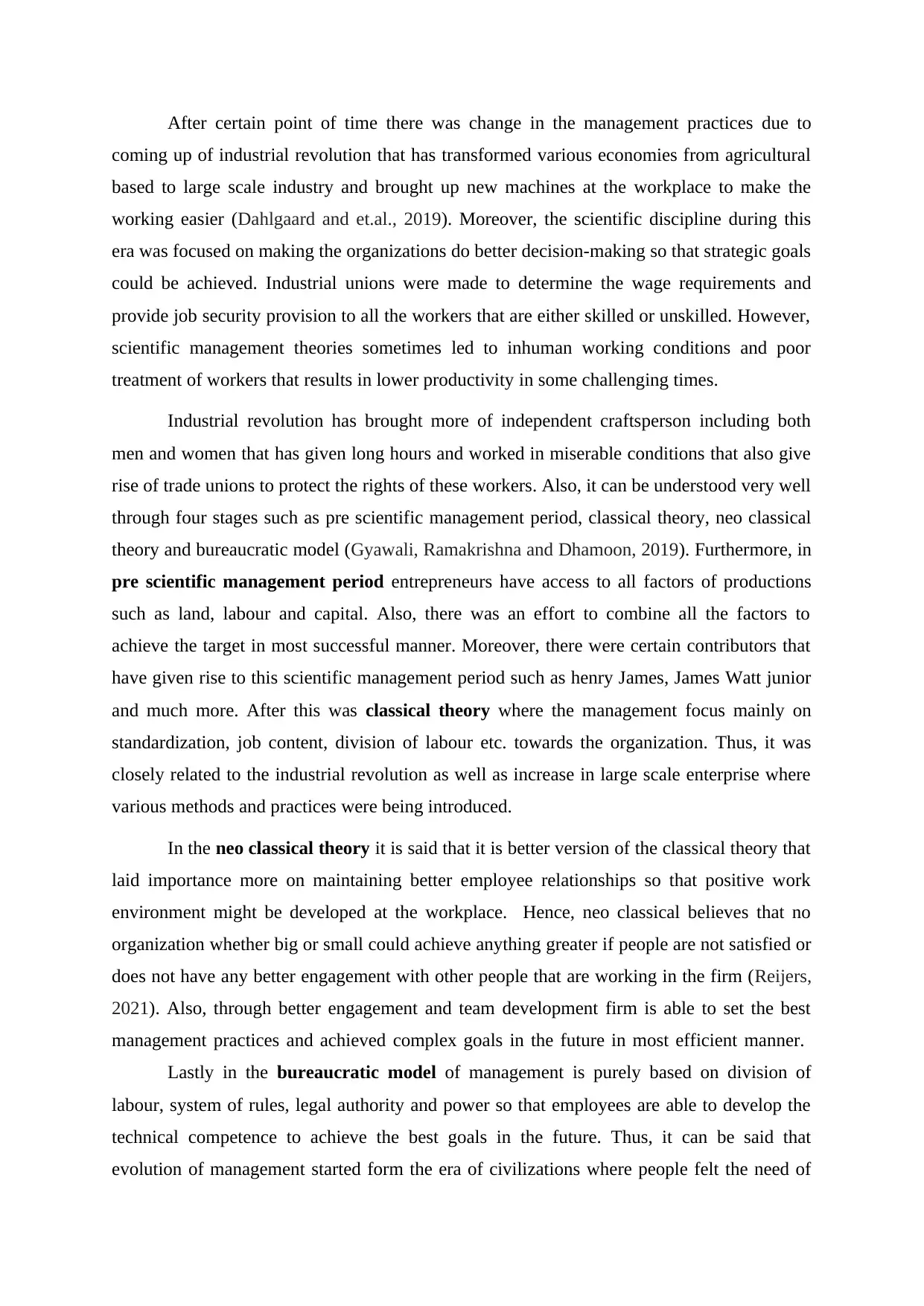
After certain point of time there was change in the management practices due to
coming up of industrial revolution that has transformed various economies from agricultural
based to large scale industry and brought up new machines at the workplace to make the
working easier (Dahlgaard and et.al., 2019). Moreover, the scientific discipline during this
era was focused on making the organizations do better decision-making so that strategic goals
could be achieved. Industrial unions were made to determine the wage requirements and
provide job security provision to all the workers that are either skilled or unskilled. However,
scientific management theories sometimes led to inhuman working conditions and poor
treatment of workers that results in lower productivity in some challenging times.
Industrial revolution has brought more of independent craftsperson including both
men and women that has given long hours and worked in miserable conditions that also give
rise of trade unions to protect the rights of these workers. Also, it can be understood very well
through four stages such as pre scientific management period, classical theory, neo classical
theory and bureaucratic model (Gyawali, Ramakrishna and Dhamoon, 2019). Furthermore, in
pre scientific management period entrepreneurs have access to all factors of productions
such as land, labour and capital. Also, there was an effort to combine all the factors to
achieve the target in most successful manner. Moreover, there were certain contributors that
have given rise to this scientific management period such as henry James, James Watt junior
and much more. After this was classical theory where the management focus mainly on
standardization, job content, division of labour etc. towards the organization. Thus, it was
closely related to the industrial revolution as well as increase in large scale enterprise where
various methods and practices were being introduced.
In the neo classical theory it is said that it is better version of the classical theory that
laid importance more on maintaining better employee relationships so that positive work
environment might be developed at the workplace. Hence, neo classical believes that no
organization whether big or small could achieve anything greater if people are not satisfied or
does not have any better engagement with other people that are working in the firm (Reijers,
2021). Also, through better engagement and team development firm is able to set the best
management practices and achieved complex goals in the future in most efficient manner.
Lastly in the bureaucratic model of management is purely based on division of
labour, system of rules, legal authority and power so that employees are able to develop the
technical competence to achieve the best goals in the future. Thus, it can be said that
evolution of management started form the era of civilizations where people felt the need of
coming up of industrial revolution that has transformed various economies from agricultural
based to large scale industry and brought up new machines at the workplace to make the
working easier (Dahlgaard and et.al., 2019). Moreover, the scientific discipline during this
era was focused on making the organizations do better decision-making so that strategic goals
could be achieved. Industrial unions were made to determine the wage requirements and
provide job security provision to all the workers that are either skilled or unskilled. However,
scientific management theories sometimes led to inhuman working conditions and poor
treatment of workers that results in lower productivity in some challenging times.
Industrial revolution has brought more of independent craftsperson including both
men and women that has given long hours and worked in miserable conditions that also give
rise of trade unions to protect the rights of these workers. Also, it can be understood very well
through four stages such as pre scientific management period, classical theory, neo classical
theory and bureaucratic model (Gyawali, Ramakrishna and Dhamoon, 2019). Furthermore, in
pre scientific management period entrepreneurs have access to all factors of productions
such as land, labour and capital. Also, there was an effort to combine all the factors to
achieve the target in most successful manner. Moreover, there were certain contributors that
have given rise to this scientific management period such as henry James, James Watt junior
and much more. After this was classical theory where the management focus mainly on
standardization, job content, division of labour etc. towards the organization. Thus, it was
closely related to the industrial revolution as well as increase in large scale enterprise where
various methods and practices were being introduced.
In the neo classical theory it is said that it is better version of the classical theory that
laid importance more on maintaining better employee relationships so that positive work
environment might be developed at the workplace. Hence, neo classical believes that no
organization whether big or small could achieve anything greater if people are not satisfied or
does not have any better engagement with other people that are working in the firm (Reijers,
2021). Also, through better engagement and team development firm is able to set the best
management practices and achieved complex goals in the future in most efficient manner.
Lastly in the bureaucratic model of management is purely based on division of
labour, system of rules, legal authority and power so that employees are able to develop the
technical competence to achieve the best goals in the future. Thus, it can be said that
evolution of management started form the era of civilizations where people felt the need of
Paraphrase This Document
Need a fresh take? Get an instant paraphrase of this document with our AI Paraphraser
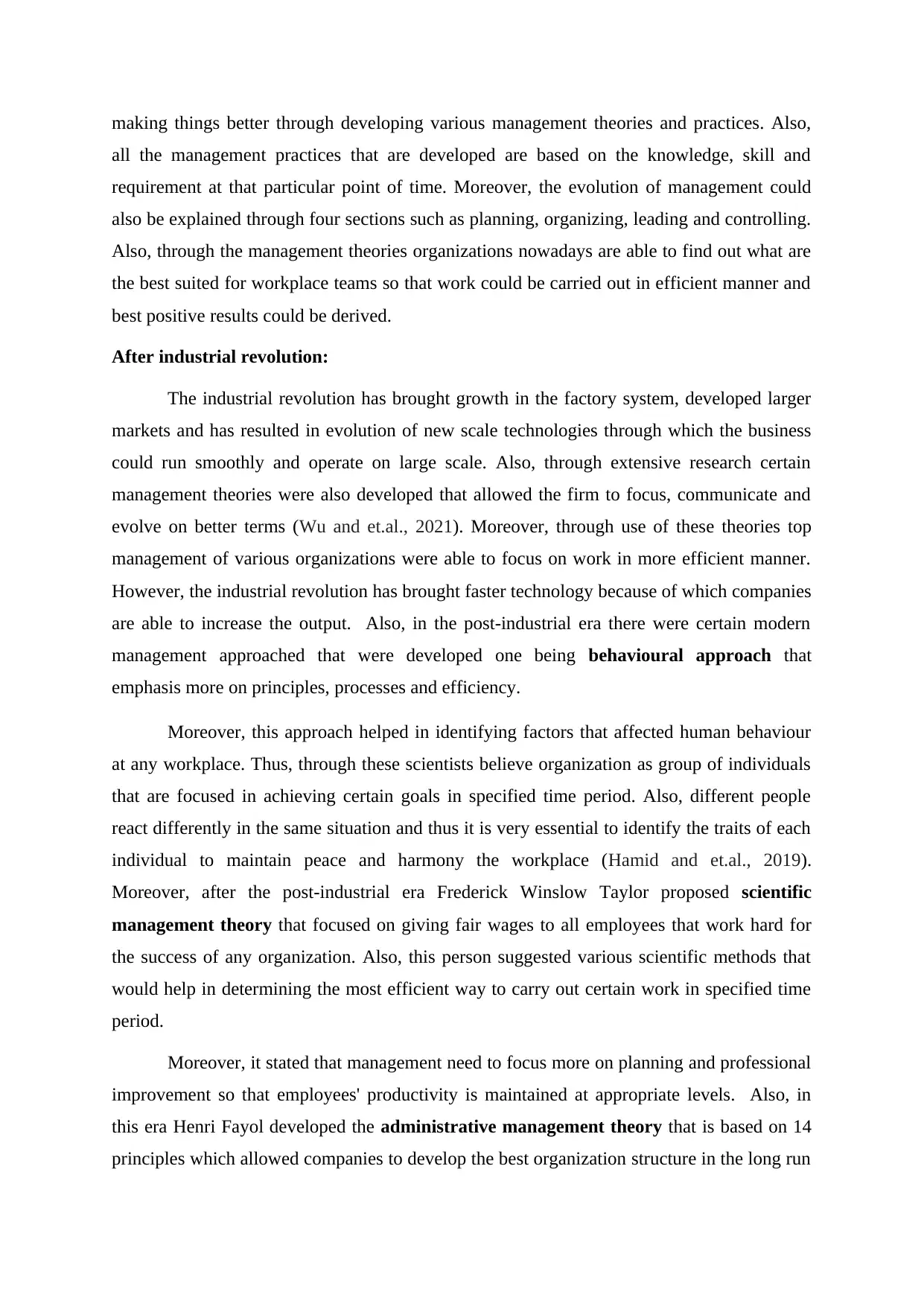
making things better through developing various management theories and practices. Also,
all the management practices that are developed are based on the knowledge, skill and
requirement at that particular point of time. Moreover, the evolution of management could
also be explained through four sections such as planning, organizing, leading and controlling.
Also, through the management theories organizations nowadays are able to find out what are
the best suited for workplace teams so that work could be carried out in efficient manner and
best positive results could be derived.
After industrial revolution:
The industrial revolution has brought growth in the factory system, developed larger
markets and has resulted in evolution of new scale technologies through which the business
could run smoothly and operate on large scale. Also, through extensive research certain
management theories were also developed that allowed the firm to focus, communicate and
evolve on better terms (Wu and et.al., 2021). Moreover, through use of these theories top
management of various organizations were able to focus on work in more efficient manner.
However, the industrial revolution has brought faster technology because of which companies
are able to increase the output. Also, in the post-industrial era there were certain modern
management approached that were developed one being behavioural approach that
emphasis more on principles, processes and efficiency.
Moreover, this approach helped in identifying factors that affected human behaviour
at any workplace. Thus, through these scientists believe organization as group of individuals
that are focused in achieving certain goals in specified time period. Also, different people
react differently in the same situation and thus it is very essential to identify the traits of each
individual to maintain peace and harmony the workplace (Hamid and et.al., 2019).
Moreover, after the post-industrial era Frederick Winslow Taylor proposed scientific
management theory that focused on giving fair wages to all employees that work hard for
the success of any organization. Also, this person suggested various scientific methods that
would help in determining the most efficient way to carry out certain work in specified time
period.
Moreover, it stated that management need to focus more on planning and professional
improvement so that employees' productivity is maintained at appropriate levels. Also, in
this era Henri Fayol developed the administrative management theory that is based on 14
principles which allowed companies to develop the best organization structure in the long run
all the management practices that are developed are based on the knowledge, skill and
requirement at that particular point of time. Moreover, the evolution of management could
also be explained through four sections such as planning, organizing, leading and controlling.
Also, through the management theories organizations nowadays are able to find out what are
the best suited for workplace teams so that work could be carried out in efficient manner and
best positive results could be derived.
After industrial revolution:
The industrial revolution has brought growth in the factory system, developed larger
markets and has resulted in evolution of new scale technologies through which the business
could run smoothly and operate on large scale. Also, through extensive research certain
management theories were also developed that allowed the firm to focus, communicate and
evolve on better terms (Wu and et.al., 2021). Moreover, through use of these theories top
management of various organizations were able to focus on work in more efficient manner.
However, the industrial revolution has brought faster technology because of which companies
are able to increase the output. Also, in the post-industrial era there were certain modern
management approached that were developed one being behavioural approach that
emphasis more on principles, processes and efficiency.
Moreover, this approach helped in identifying factors that affected human behaviour
at any workplace. Thus, through these scientists believe organization as group of individuals
that are focused in achieving certain goals in specified time period. Also, different people
react differently in the same situation and thus it is very essential to identify the traits of each
individual to maintain peace and harmony the workplace (Hamid and et.al., 2019).
Moreover, after the post-industrial era Frederick Winslow Taylor proposed scientific
management theory that focused on giving fair wages to all employees that work hard for
the success of any organization. Also, this person suggested various scientific methods that
would help in determining the most efficient way to carry out certain work in specified time
period.
Moreover, it stated that management need to focus more on planning and professional
improvement so that employees' productivity is maintained at appropriate levels. Also, in
this era Henri Fayol developed the administrative management theory that is based on 14
principles which allowed companies to develop the best organization structure in the long run
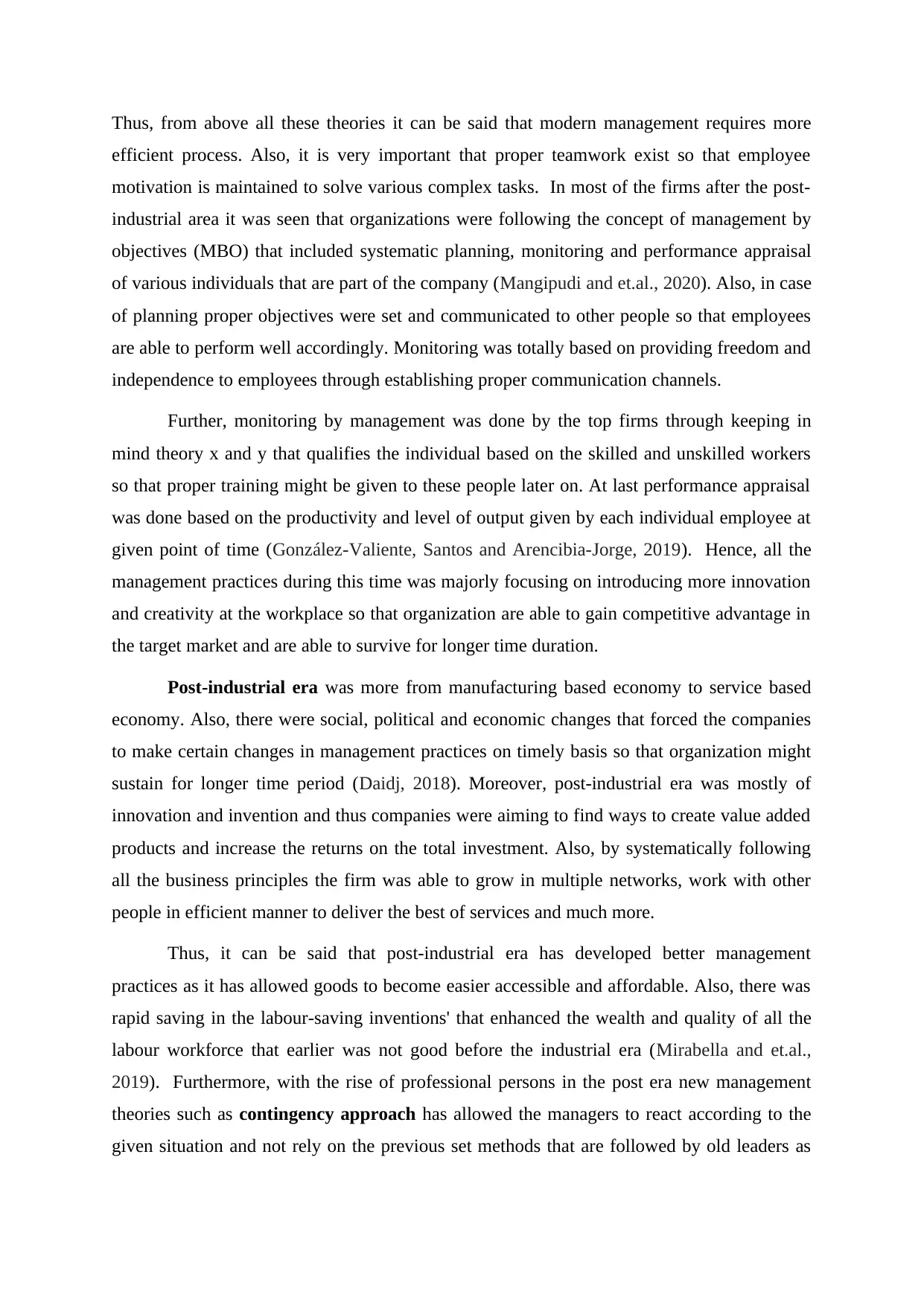
Thus, from above all these theories it can be said that modern management requires more
efficient process. Also, it is very important that proper teamwork exist so that employee
motivation is maintained to solve various complex tasks. In most of the firms after the post-
industrial area it was seen that organizations were following the concept of management by
objectives (MBO) that included systematic planning, monitoring and performance appraisal
of various individuals that are part of the company (Mangipudi and et.al., 2020). Also, in case
of planning proper objectives were set and communicated to other people so that employees
are able to perform well accordingly. Monitoring was totally based on providing freedom and
independence to employees through establishing proper communication channels.
Further, monitoring by management was done by the top firms through keeping in
mind theory x and y that qualifies the individual based on the skilled and unskilled workers
so that proper training might be given to these people later on. At last performance appraisal
was done based on the productivity and level of output given by each individual employee at
given point of time (González-Valiente, Santos and Arencibia-Jorge, 2019). Hence, all the
management practices during this time was majorly focusing on introducing more innovation
and creativity at the workplace so that organization are able to gain competitive advantage in
the target market and are able to survive for longer time duration.
Post-industrial era was more from manufacturing based economy to service based
economy. Also, there were social, political and economic changes that forced the companies
to make certain changes in management practices on timely basis so that organization might
sustain for longer time period (Daidj, 2018). Moreover, post-industrial era was mostly of
innovation and invention and thus companies were aiming to find ways to create value added
products and increase the returns on the total investment. Also, by systematically following
all the business principles the firm was able to grow in multiple networks, work with other
people in efficient manner to deliver the best of services and much more.
Thus, it can be said that post-industrial era has developed better management
practices as it has allowed goods to become easier accessible and affordable. Also, there was
rapid saving in the labour-saving inventions' that enhanced the wealth and quality of all the
labour workforce that earlier was not good before the industrial era (Mirabella and et.al.,
2019). Furthermore, with the rise of professional persons in the post era new management
theories such as contingency approach has allowed the managers to react according to the
given situation and not rely on the previous set methods that are followed by old leaders as
efficient process. Also, it is very important that proper teamwork exist so that employee
motivation is maintained to solve various complex tasks. In most of the firms after the post-
industrial area it was seen that organizations were following the concept of management by
objectives (MBO) that included systematic planning, monitoring and performance appraisal
of various individuals that are part of the company (Mangipudi and et.al., 2020). Also, in case
of planning proper objectives were set and communicated to other people so that employees
are able to perform well accordingly. Monitoring was totally based on providing freedom and
independence to employees through establishing proper communication channels.
Further, monitoring by management was done by the top firms through keeping in
mind theory x and y that qualifies the individual based on the skilled and unskilled workers
so that proper training might be given to these people later on. At last performance appraisal
was done based on the productivity and level of output given by each individual employee at
given point of time (González-Valiente, Santos and Arencibia-Jorge, 2019). Hence, all the
management practices during this time was majorly focusing on introducing more innovation
and creativity at the workplace so that organization are able to gain competitive advantage in
the target market and are able to survive for longer time duration.
Post-industrial era was more from manufacturing based economy to service based
economy. Also, there were social, political and economic changes that forced the companies
to make certain changes in management practices on timely basis so that organization might
sustain for longer time period (Daidj, 2018). Moreover, post-industrial era was mostly of
innovation and invention and thus companies were aiming to find ways to create value added
products and increase the returns on the total investment. Also, by systematically following
all the business principles the firm was able to grow in multiple networks, work with other
people in efficient manner to deliver the best of services and much more.
Thus, it can be said that post-industrial era has developed better management
practices as it has allowed goods to become easier accessible and affordable. Also, there was
rapid saving in the labour-saving inventions' that enhanced the wealth and quality of all the
labour workforce that earlier was not good before the industrial era (Mirabella and et.al.,
2019). Furthermore, with the rise of professional persons in the post era new management
theories such as contingency approach has allowed the managers to react according to the
given situation and not rely on the previous set methods that are followed by old leaders as
⊘ This is a preview!⊘
Do you want full access?
Subscribe today to unlock all pages.

Trusted by 1+ million students worldwide
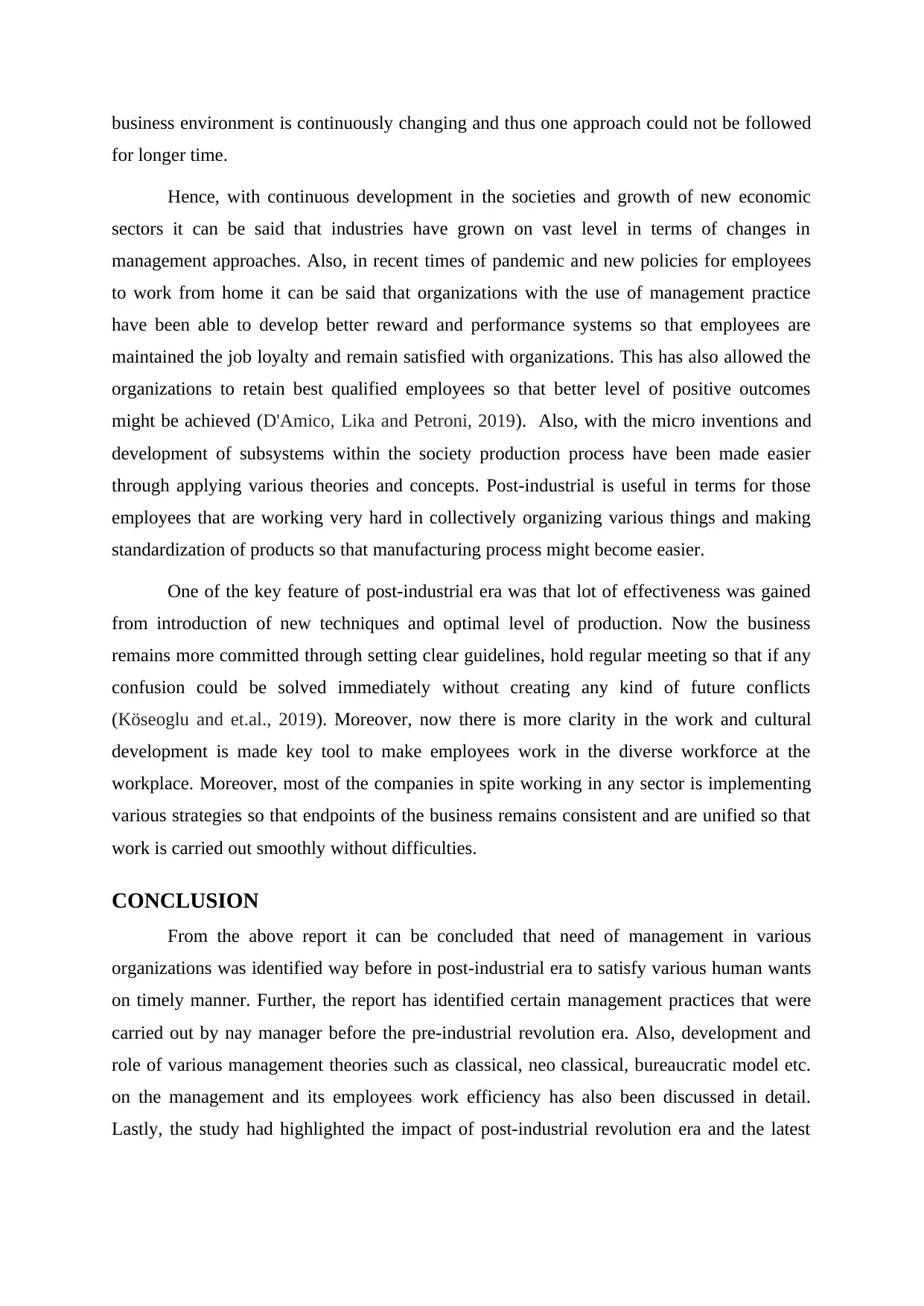
business environment is continuously changing and thus one approach could not be followed
for longer time.
Hence, with continuous development in the societies and growth of new economic
sectors it can be said that industries have grown on vast level in terms of changes in
management approaches. Also, in recent times of pandemic and new policies for employees
to work from home it can be said that organizations with the use of management practice
have been able to develop better reward and performance systems so that employees are
maintained the job loyalty and remain satisfied with organizations. This has also allowed the
organizations to retain best qualified employees so that better level of positive outcomes
might be achieved (D'Amico, Lika and Petroni, 2019). Also, with the micro inventions and
development of subsystems within the society production process have been made easier
through applying various theories and concepts. Post-industrial is useful in terms for those
employees that are working very hard in collectively organizing various things and making
standardization of products so that manufacturing process might become easier.
One of the key feature of post-industrial era was that lot of effectiveness was gained
from introduction of new techniques and optimal level of production. Now the business
remains more committed through setting clear guidelines, hold regular meeting so that if any
confusion could be solved immediately without creating any kind of future conflicts
(Köseoglu and et.al., 2019). Moreover, now there is more clarity in the work and cultural
development is made key tool to make employees work in the diverse workforce at the
workplace. Moreover, most of the companies in spite working in any sector is implementing
various strategies so that endpoints of the business remains consistent and are unified so that
work is carried out smoothly without difficulties.
CONCLUSION
From the above report it can be concluded that need of management in various
organizations was identified way before in post-industrial era to satisfy various human wants
on timely manner. Further, the report has identified certain management practices that were
carried out by nay manager before the pre-industrial revolution era. Also, development and
role of various management theories such as classical, neo classical, bureaucratic model etc.
on the management and its employees work efficiency has also been discussed in detail.
Lastly, the study had highlighted the impact of post-industrial revolution era and the latest
for longer time.
Hence, with continuous development in the societies and growth of new economic
sectors it can be said that industries have grown on vast level in terms of changes in
management approaches. Also, in recent times of pandemic and new policies for employees
to work from home it can be said that organizations with the use of management practice
have been able to develop better reward and performance systems so that employees are
maintained the job loyalty and remain satisfied with organizations. This has also allowed the
organizations to retain best qualified employees so that better level of positive outcomes
might be achieved (D'Amico, Lika and Petroni, 2019). Also, with the micro inventions and
development of subsystems within the society production process have been made easier
through applying various theories and concepts. Post-industrial is useful in terms for those
employees that are working very hard in collectively organizing various things and making
standardization of products so that manufacturing process might become easier.
One of the key feature of post-industrial era was that lot of effectiveness was gained
from introduction of new techniques and optimal level of production. Now the business
remains more committed through setting clear guidelines, hold regular meeting so that if any
confusion could be solved immediately without creating any kind of future conflicts
(Köseoglu and et.al., 2019). Moreover, now there is more clarity in the work and cultural
development is made key tool to make employees work in the diverse workforce at the
workplace. Moreover, most of the companies in spite working in any sector is implementing
various strategies so that endpoints of the business remains consistent and are unified so that
work is carried out smoothly without difficulties.
CONCLUSION
From the above report it can be concluded that need of management in various
organizations was identified way before in post-industrial era to satisfy various human wants
on timely manner. Further, the report has identified certain management practices that were
carried out by nay manager before the pre-industrial revolution era. Also, development and
role of various management theories such as classical, neo classical, bureaucratic model etc.
on the management and its employees work efficiency has also been discussed in detail.
Lastly, the study had highlighted the impact of post-industrial revolution era and the latest
Paraphrase This Document
Need a fresh take? Get an instant paraphrase of this document with our AI Paraphraser
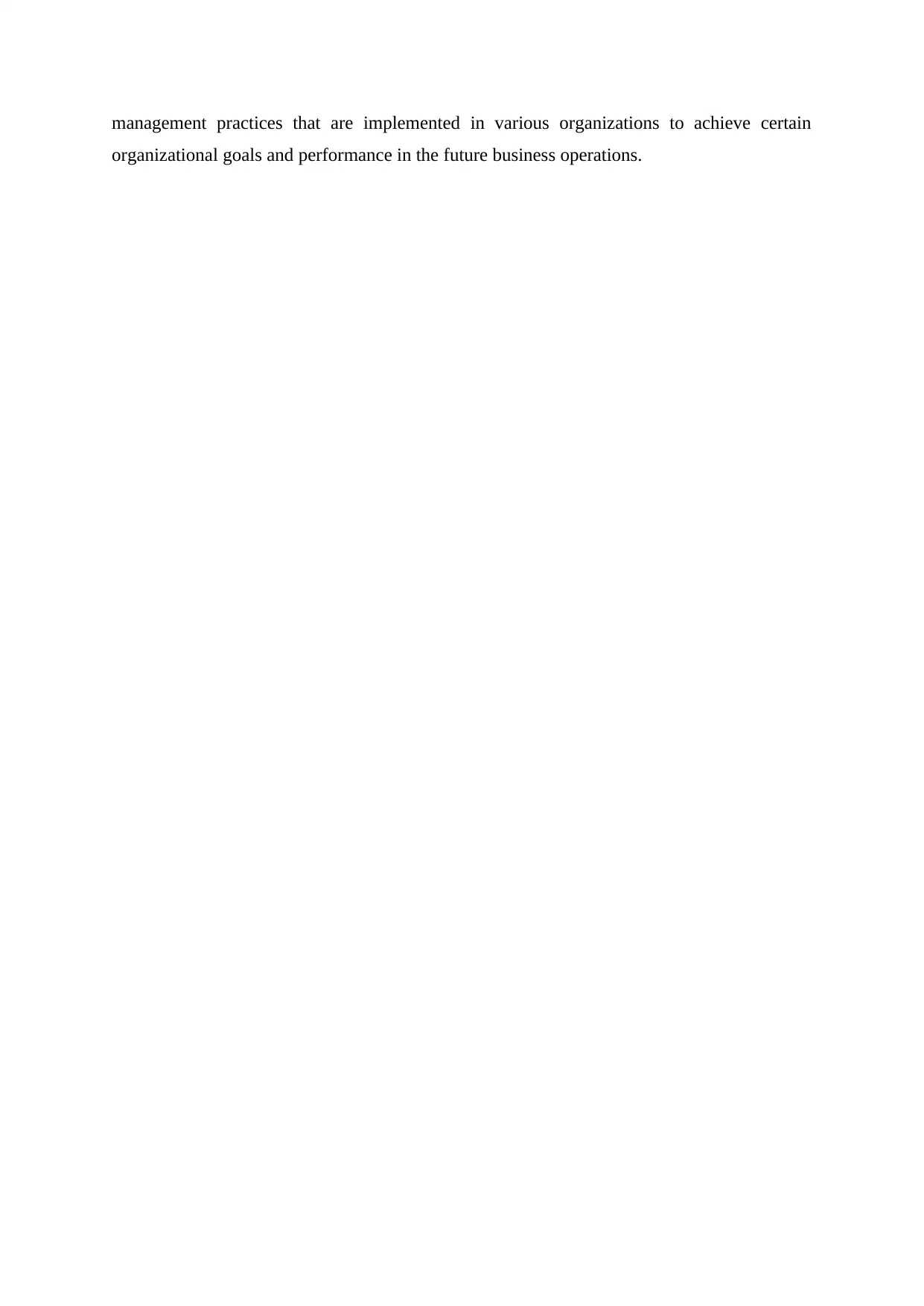
management practices that are implemented in various organizations to achieve certain
organizational goals and performance in the future business operations.
organizational goals and performance in the future business operations.
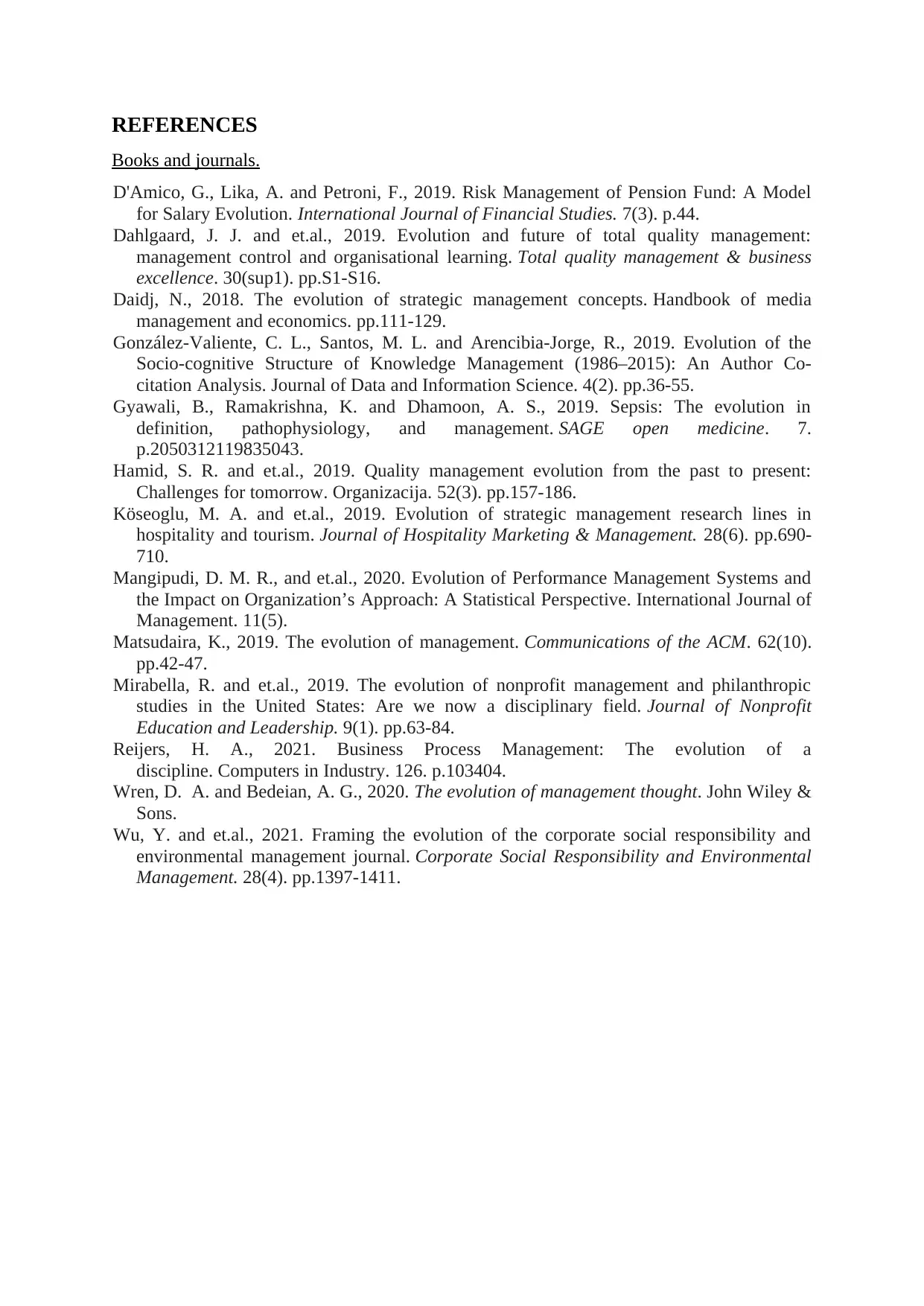
REFERENCES
Books and journals.
D'Amico, G., Lika, A. and Petroni, F., 2019. Risk Management of Pension Fund: A Model
for Salary Evolution. International Journal of Financial Studies. 7(3). p.44.
Dahlgaard, J. J. and et.al., 2019. Evolution and future of total quality management:
management control and organisational learning. Total quality management & business
excellence. 30(sup1). pp.S1-S16.
Daidj, N., 2018. The evolution of strategic management concepts. Handbook of media
management and economics. pp.111-129.
González-Valiente, C. L., Santos, M. L. and Arencibia-Jorge, R., 2019. Evolution of the
Socio-cognitive Structure of Knowledge Management (1986–2015): An Author Co-
citation Analysis. Journal of Data and Information Science. 4(2). pp.36-55.
Gyawali, B., Ramakrishna, K. and Dhamoon, A. S., 2019. Sepsis: The evolution in
definition, pathophysiology, and management. SAGE open medicine. 7.
p.2050312119835043.
Hamid, S. R. and et.al., 2019. Quality management evolution from the past to present:
Challenges for tomorrow. Organizacija. 52(3). pp.157-186.
Köseoglu, M. A. and et.al., 2019. Evolution of strategic management research lines in
hospitality and tourism. Journal of Hospitality Marketing & Management. 28(6). pp.690-
710.
Mangipudi, D. M. R., and et.al., 2020. Evolution of Performance Management Systems and
the Impact on Organization’s Approach: A Statistical Perspective. International Journal of
Management. 11(5).
Matsudaira, K., 2019. The evolution of management. Communications of the ACM. 62(10).
pp.42-47.
Mirabella, R. and et.al., 2019. The evolution of nonprofit management and philanthropic
studies in the United States: Are we now a disciplinary field. Journal of Nonprofit
Education and Leadership. 9(1). pp.63-84.
Reijers, H. A., 2021. Business Process Management: The evolution of a
discipline. Computers in Industry. 126. p.103404.
Wren, D. A. and Bedeian, A. G., 2020. The evolution of management thought. John Wiley &
Sons.
Wu, Y. and et.al., 2021. Framing the evolution of the corporate social responsibility and
environmental management journal. Corporate Social Responsibility and Environmental
Management. 28(4). pp.1397-1411.
Books and journals.
D'Amico, G., Lika, A. and Petroni, F., 2019. Risk Management of Pension Fund: A Model
for Salary Evolution. International Journal of Financial Studies. 7(3). p.44.
Dahlgaard, J. J. and et.al., 2019. Evolution and future of total quality management:
management control and organisational learning. Total quality management & business
excellence. 30(sup1). pp.S1-S16.
Daidj, N., 2018. The evolution of strategic management concepts. Handbook of media
management and economics. pp.111-129.
González-Valiente, C. L., Santos, M. L. and Arencibia-Jorge, R., 2019. Evolution of the
Socio-cognitive Structure of Knowledge Management (1986–2015): An Author Co-
citation Analysis. Journal of Data and Information Science. 4(2). pp.36-55.
Gyawali, B., Ramakrishna, K. and Dhamoon, A. S., 2019. Sepsis: The evolution in
definition, pathophysiology, and management. SAGE open medicine. 7.
p.2050312119835043.
Hamid, S. R. and et.al., 2019. Quality management evolution from the past to present:
Challenges for tomorrow. Organizacija. 52(3). pp.157-186.
Köseoglu, M. A. and et.al., 2019. Evolution of strategic management research lines in
hospitality and tourism. Journal of Hospitality Marketing & Management. 28(6). pp.690-
710.
Mangipudi, D. M. R., and et.al., 2020. Evolution of Performance Management Systems and
the Impact on Organization’s Approach: A Statistical Perspective. International Journal of
Management. 11(5).
Matsudaira, K., 2019. The evolution of management. Communications of the ACM. 62(10).
pp.42-47.
Mirabella, R. and et.al., 2019. The evolution of nonprofit management and philanthropic
studies in the United States: Are we now a disciplinary field. Journal of Nonprofit
Education and Leadership. 9(1). pp.63-84.
Reijers, H. A., 2021. Business Process Management: The evolution of a
discipline. Computers in Industry. 126. p.103404.
Wren, D. A. and Bedeian, A. G., 2020. The evolution of management thought. John Wiley &
Sons.
Wu, Y. and et.al., 2021. Framing the evolution of the corporate social responsibility and
environmental management journal. Corporate Social Responsibility and Environmental
Management. 28(4). pp.1397-1411.
⊘ This is a preview!⊘
Do you want full access?
Subscribe today to unlock all pages.

Trusted by 1+ million students worldwide
1 out of 9
Related Documents
Your All-in-One AI-Powered Toolkit for Academic Success.
+13062052269
info@desklib.com
Available 24*7 on WhatsApp / Email
![[object Object]](/_next/static/media/star-bottom.7253800d.svg)
Unlock your academic potential
Copyright © 2020–2026 A2Z Services. All Rights Reserved. Developed and managed by ZUCOL.





